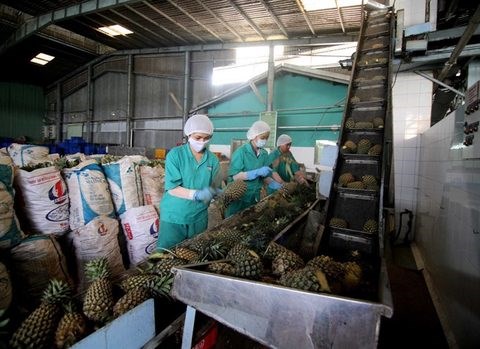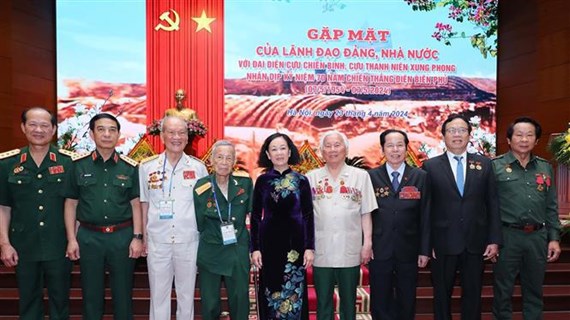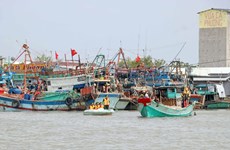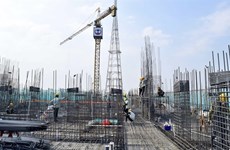EU-Vietnam pact eagerly awaited
Vietnam’s upcoming free trade agreement with the European Union is expected to make Vietnam the most promising business destination for European companies in Southeast Asia.
 A fruit processing line for exports at An Giang Fruits-Vegetables and Foodstuff Join Stock Company (Source: VNA)
A fruit processing line for exports at An Giang Fruits-Vegetables and Foodstuff Join Stock Company (Source: VNA)The statement was made by Michael Behrens, Chairman of the European Chamber of Commerce in Vietnam (EuroCham), at a conference on the 2017 Whitebook in Hanoi on March 2.
The Whitebook, annually published by EuroCham, provides a concise view of key concerns affecting European businesses in Vietnam in regards to trade, investment, growth and employment. This is the 9th edition of EuroCham’s annual advocacy publication on trade and investment.
Parts of this year’s Whitebook were dedicated to the EVFTA, its implementation and its impact on business. Behrens said the first estimates of EVFTA’s impact show clear gains for Vietnam’s growth and welfare, as well as for overall trade between the EU and Vietnam.
The country will be the bridge linking more than 500 million people in Southeast Asia and more than 500 million Europeans - "a fantastic prospect", Behrens said.
Attending the event, Deputy Minister of Industry and Trade Hoang Quoc Vuong said the Whitebook was an effective tool for the Ministry of Industry and Trade (MoIT) to review policies and devise better solutions to improve the efficiency of management systems.
Vuong said the European Union is one of Vietnam’s most important trading partners, adding that in 2016, the EU was Vietnam’s second largest exporter with a total export turnover of nearly US$34 billion, accounting for over 19 percent of the country’s total export turnover.
In the context of the upcoming bilateral trade treaty, expected to be implemented in 2018, MoIT will endeavor to enhance internal resources and improve the business environment, meeting the legitimate needs of local and European firms operating in Vietnam.
Attractive FDI destination
According to the Whitebook, with the expansion of market access for foreign investors, Vietnam is expected to witness a strong wave of foreign direct investment (FDI).
In addition to the numerous legal changes it has made in accordance with the treaty, Vietnam has fundamental elements that contribute to its continued growth.
Vietnam is in a demographic golden age, with 25 percent of its 90 million population between 10 and 24 years old. GDP per capita is increasing dramatically and Vietnam has the fastest-growing middle class in Southeast Asia (12.9 percent per annum over the period 2012-2020).
With its high literacy rate and education levels, comparatively low wages, connectivity and a central location within ASEAN, more and more foreign investors are choosing Vietnam as their hub to service the Mekong region and beyond, the book said.
Vietnam’s attractive profile is reflected in its welcoming approach to foreign direct investment (FDI) in manufacturing activities. The gradual opening of most service sectors under Vietnam’s World Trade Organisation (WTO) commitments schedule that began in 2007 was completed in 2015.
Domestic law has expanded market access in some sectors beyond those included in Vietnam’s WTO commitments. For example, foreign shareholding in public companies was previously capped at 49 percent but is now generally open for up to 100 percent foreign ownership.
Vietnam also grants investment incentives, including tax breaks, in areas such as high-tech, environmental technology, and agriculture, where European businesses are global leaders.
Vietnam’s development and its strong appeal to foreign investors are undeniable, the book said, but noted that the licensing process for foreign investment projects is sometimes unclear.
Many foreign investors also still face significant challenges when dealing with Vietnam’s bureaucracy. Tax filling, customs clearance, business registration and licencing and other administrative procedures are often delayed. Businesses find themselves spending resources on administration that they would prefer to invest to expand their core activities.-VNA













